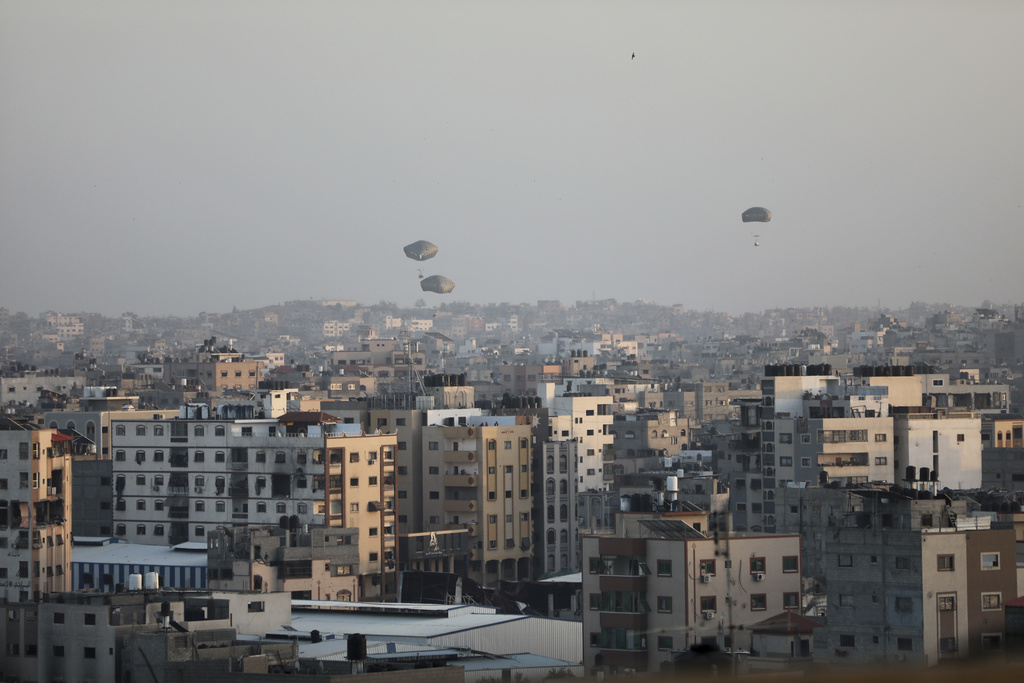The U.S. conducted its first airdrop into Gaza over the weekend, a move made to prevent further degradation of the humanitarian situation in the strip.
President Joe Biden’s decision to move forward with air-dropping aid represents a culmination of sorts after months of U.S. officials urging the Israelis to increase the amount of humanitarian assistance permitted to enter the strip.
On Saturday afternoon, U.S. and Jordanian air forces in three C-130 aircraft dropped over 38,000 meals along the Gaza coast. The meals were in 66 bundles, 22 on each of the three aircraft. A senior administration official told reporters the aid was dropped in specific areas where they “thought people would be able to best access” it.
U.S. officials said Saturday’s aid airdrop would be the first of multiple, though the schedule or total number of airdrops has not been disclosed.
Biden announced his decision that the military would drop aid into Gaza last Friday because not enough aid was getting in to help the Palestinian civilians caught in the middle of a war.
“We’re going to insist that Israel facilitate more trucks and more routes to get more and more people the help they need. No excuses,” Biden said. “Because the truth is, aid flowing to Gaza is nowhere nearly enough now. It’s nowhere nearly enough.”

It also came days after dozens of Palestinians were killed when a mob of people converged on an aid convoy.
Israel largely controls what goes into Gaza, and U.S. officials have pushed them to allow more aid into the strip.
The Biden administration sought to balance supporting its closest ally in the Middle East, even as criticism of Israel mounted internationally, with the growing humanitarian crisis in Gaza, which includes the displacement of a majority of the strip, tens of thousands of injured and killed civilians, and growing concerns of widespread famine and disease.
The Hamas-controlled Gaza Health Ministry has reported that more than 30,000 people have been killed since the Hamas Oct. 7 terrorist attack that prompted Israel’s war against them. Their total does not differentiate between civilians and combatants. The ministry has also said that 15 children have died due to dehydration and malnutrition.
The U.S. is hoping to “flood” Gaza with aid through various ways and in different parts of the strip, according to the official, who said a part of the problem has been “the removal of police from the protective duties,” which has allowed “criminal gangs” to loot the humanitarian aid and start “reselling it.”
“There’s a way that you resolve this problem, and the way is you flood the market. You bring in assistance from every point you can — air, sea, land — you bring it in, and you know that some of this assistance is going to be looted, is going to be self-distributed by desperate people, but you keep coming,” the official continued. “And what you do through that — and there’s international experience with this — you demonetize these commodities. And with that, you de-incentivize the criminal groups, the gangs involved in attacking trucks, and you reduce the pressure on desperate people, not criminals, who just want food — because the food is there; it’s coming in.”
Even as Israel pushed Biden and his administration with their actions and rhetoric regarding the war in Gaza, the U.S. president has declined to place any restrictions or requirements on U.S. military aid to Israel. This decision has been largely debated by more progressive parts of his own party.
The Biden administration ratcheted up its calls for an end to the war over the weekend.
Vice President Kamala Harris called for an “immediate ceasefire,” though she recognized Hamas’s need to accept the terms of a deal. The administration has pushed for a six-week ceasefire that would give time for various entities to surge humanitarian aid into the strip.
CLICK HERE TO READ MORE FROM THE WASHINGTON EXAMINER
Egyptian, Qatari, and U.S. mediators are in Egypt trying to move forward with a ceasefire deal despite the competing nonnegotiables from both sides, but the Israelis decided to skip the talks, blaming it on Hamas’s unwillingness to provide a list of the hostages who are still alive, according to CNN.
U.S. and Israeli leaders have disagreed on various components of the war, including what the “day after” should look like for Gaza. Biden supports the creation of a Palestinian state and is pursuing it in conversations regarding Gaza’s future, while Israeli leaders have disagreed.
